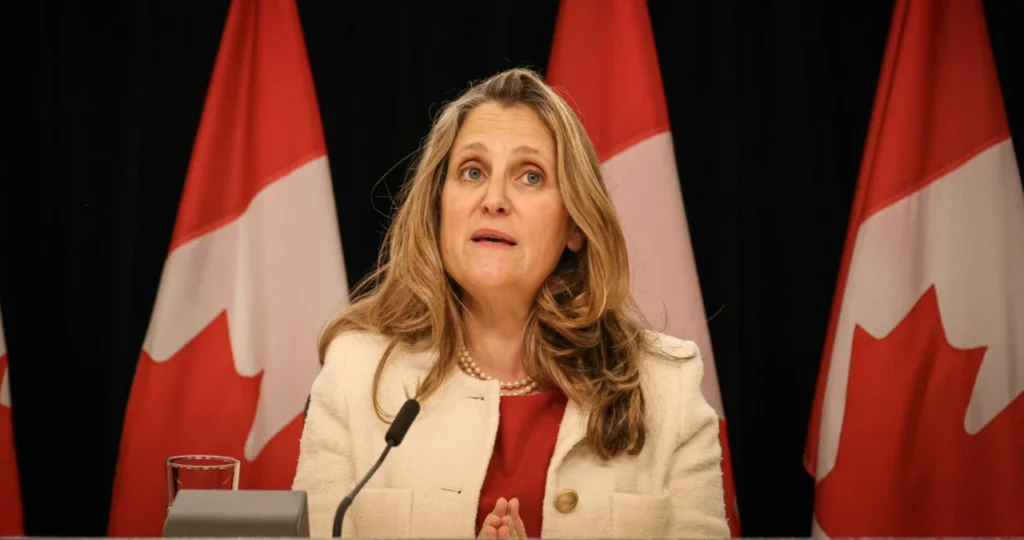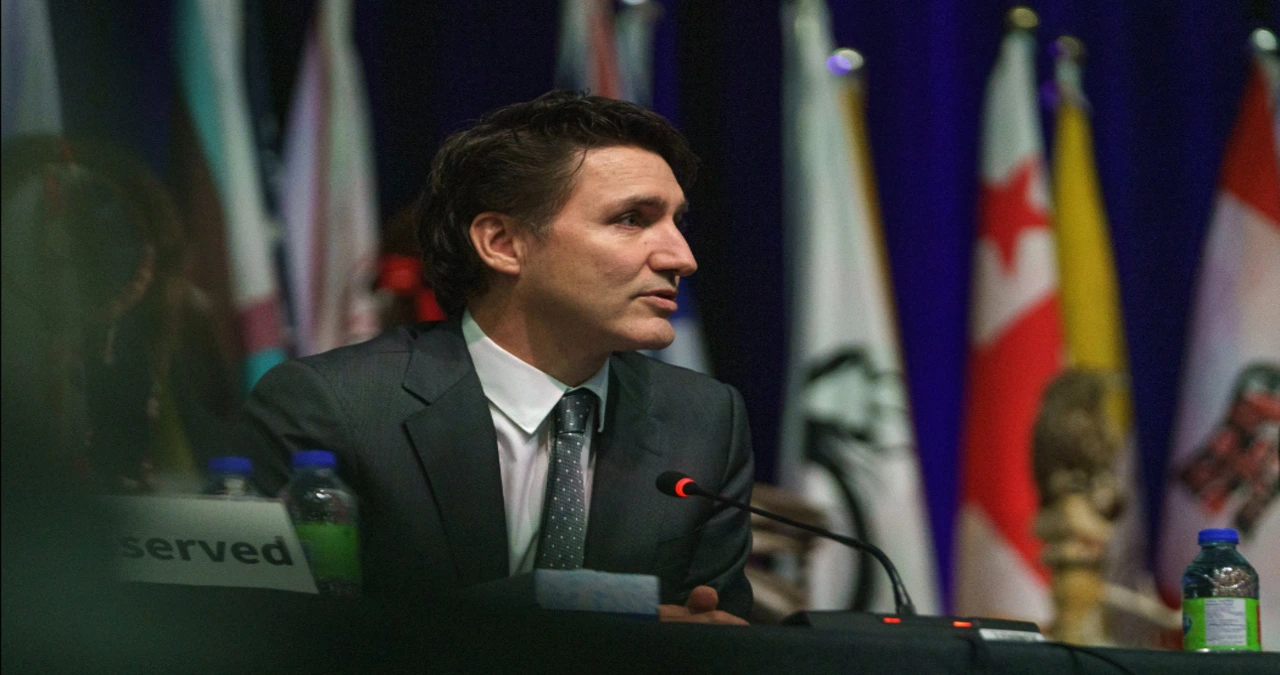featured image credit- Justin Trudeau
The Canadian political landscape has been thrown into turmoil following the resignation of Finance Minister Chrystia Freeland, who stepped down due to disagreements with Prime Minister Justin Trudeau over handling President-elect Donald Trump’s impending tariff threats.
Freeland’s Departure Amidst Economic Tensions

image credit-Chrystia Freeland
Chrystia Freeland, a pivotal figure in Trudeau’s administration, resigned after expressing concerns over the government’s approach to Trump’s proposed 25% tariffs on Canadian imports. In her resignation letter, Freeland criticized Trudeau’s economic strategies, labeling them as “costly political gimmicks” that fail to address the challenges posed by Trump’s “aggressive economic nationalism.”
Internal Strife and Calls for Trudeau’s Resignation
Freeland’s exit has intensified internal dissent within the Liberal Party. Some legislators are now urging Trudeau to consider resignation ahead of the 2025 election, questioning his leadership amid escalating economic pressures. The sudden departure of a key ally has left the government appearing disorganized, raising concerns about its readiness to confront the forthcoming U.S. administration’s trade policies.
Read Also-One Nation One Election Bill Sparks Heated Debate: A Game-Changer or Threat to Federalism?
Provincial Leaders Express Alarm
Provincial leaders, including Ontario’s Doug Ford and Alberta’s Danielle Smith, have voiced apprehension over the federal government’s current state. They fear that the lack of cohesive leadership could hinder Canada’s ability to effectively negotiate and mitigate the adverse effects of the proposed U.S. tariffs on the national economy.
Trudeau’s Political Future in Question
The convergence of internal party strife, provincial unease, and the looming economic threat from the United States has placed Prime Minister Justin Trudeau in a precarious position. As his popularity wanes and criticism mounts, Trudeau faces one of the most significant challenges of his political career, with his capacity to lead the nation through this crisis under intense scrutiny.
Conclusion
The resignation of Finance Minister Chrystia Freeland has exposed deep divisions within Canada’s government, casting doubt on its preparedness to confront imminent economic challenges posed by President-elect Donald Trump’s tariff threats. Prime Minister Justin Trudeau’s leadership is now under severe examination as the nation anticipates strategic responses to safeguard its economic interests.
FAQs on Trudeau’s Crisis Amid Trump’s Tariff Threats
- What triggered the current political crisis in Canada?
- The crisis stems from disagreements over Prime Minister Justin Trudeau’s handling of President-elect Donald Trump’s proposed 25% tariffs on Canadian imports. The situation escalated when Finance Minister Chrystia Freeland resigned, citing dissatisfaction with Trudeau’s economic strategies.
- Why did Chrystia Freeland resign?
- Freeland stepped down due to her opposition to what she described as “costly political gimmicks” by Trudeau’s government. She criticized the administration’s inability to effectively address Trump’s aggressive trade policies.
- How significant are Trump’s proposed tariffs for Canada?
- The 25% tariffs, if imposed, could severely impact Canada’s economy, particularly its manufacturing and export sectors, which rely heavily on trade with the United States.
- How has the Liberal Party reacted to Freeland’s resignation?
- The resignation has created internal strife within the party, with some members questioning Trudeau’s leadership and calling for his resignation ahead of the 2025 general election.
- What role do provincial leaders play in this crisis?
- Provincial leaders, including Ontario’s Doug Ford and Alberta’s Danielle Smith, have expressed concerns about the federal government’s lack of cohesion. They are urging swift and effective action to mitigate the potential economic fallout from the tariffs.
- How has Trudeau responded to the situation?
- As of now, Trudeau has maintained his position as Prime Minister and has yet to announce any major policy changes to address the concerns raised by Freeland and other critics.
- What are the implications of this crisis for Trudeau’s leadership?
- The political turmoil has placed Trudeau’s leadership under significant scrutiny. His ability to navigate the tariff threat and restore unity within the Liberal Party will likely determine his political future.
- What is Canada’s strategy for dealing with Trump’s tariffs?
- The government has yet to reveal a concrete strategy, but there are calls for renegotiations with the U.S. and the development of domestic policies to minimize economic disruptions.
- Has Canada faced similar trade issues in the past?
- Yes, Canada has previously dealt with trade disputes with the U.S., such as the softwood lumber dispute and tariffs on steel and aluminum. However, the current situation is unique due to the scale of the proposed tariffs and the political unrest it has triggered.
- What can Canadian citizens expect in the coming months?
- Canadians can expect intense political debates, potential policy shifts, and increased efforts to negotiate with the U.S. to avoid or reduce the impact of the proposed tariffs. Trudeau’s leadership and decisions will be critical in shaping the outcome of this crisis.
